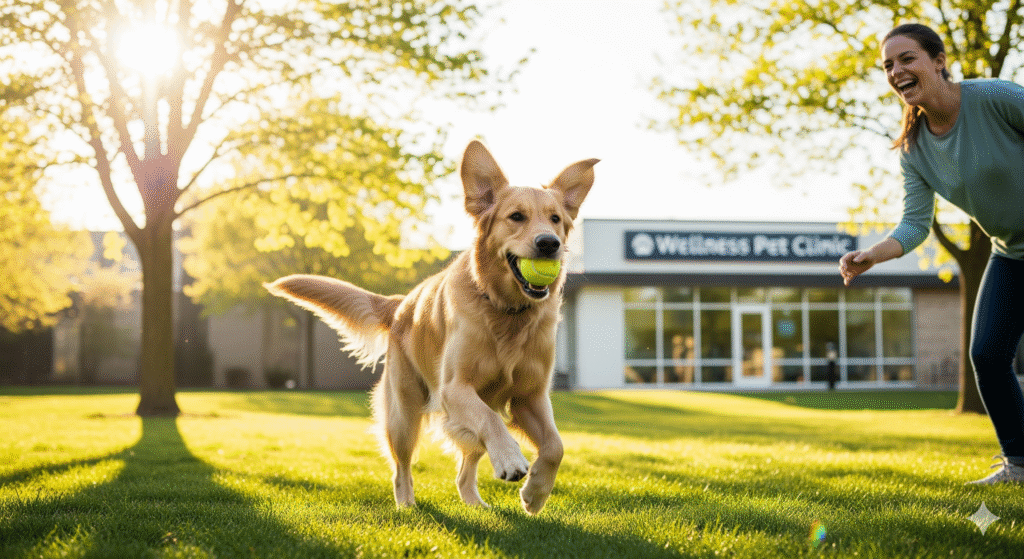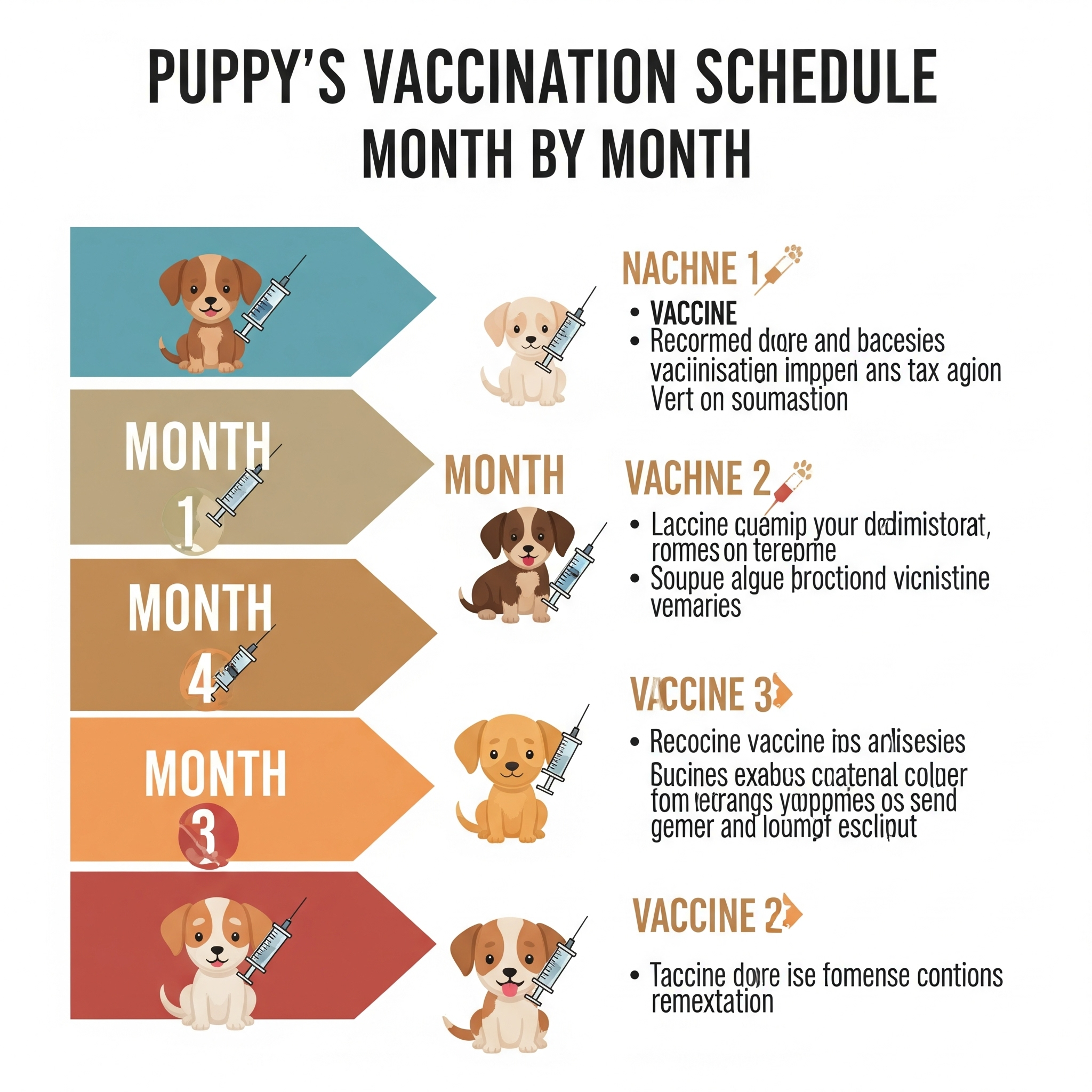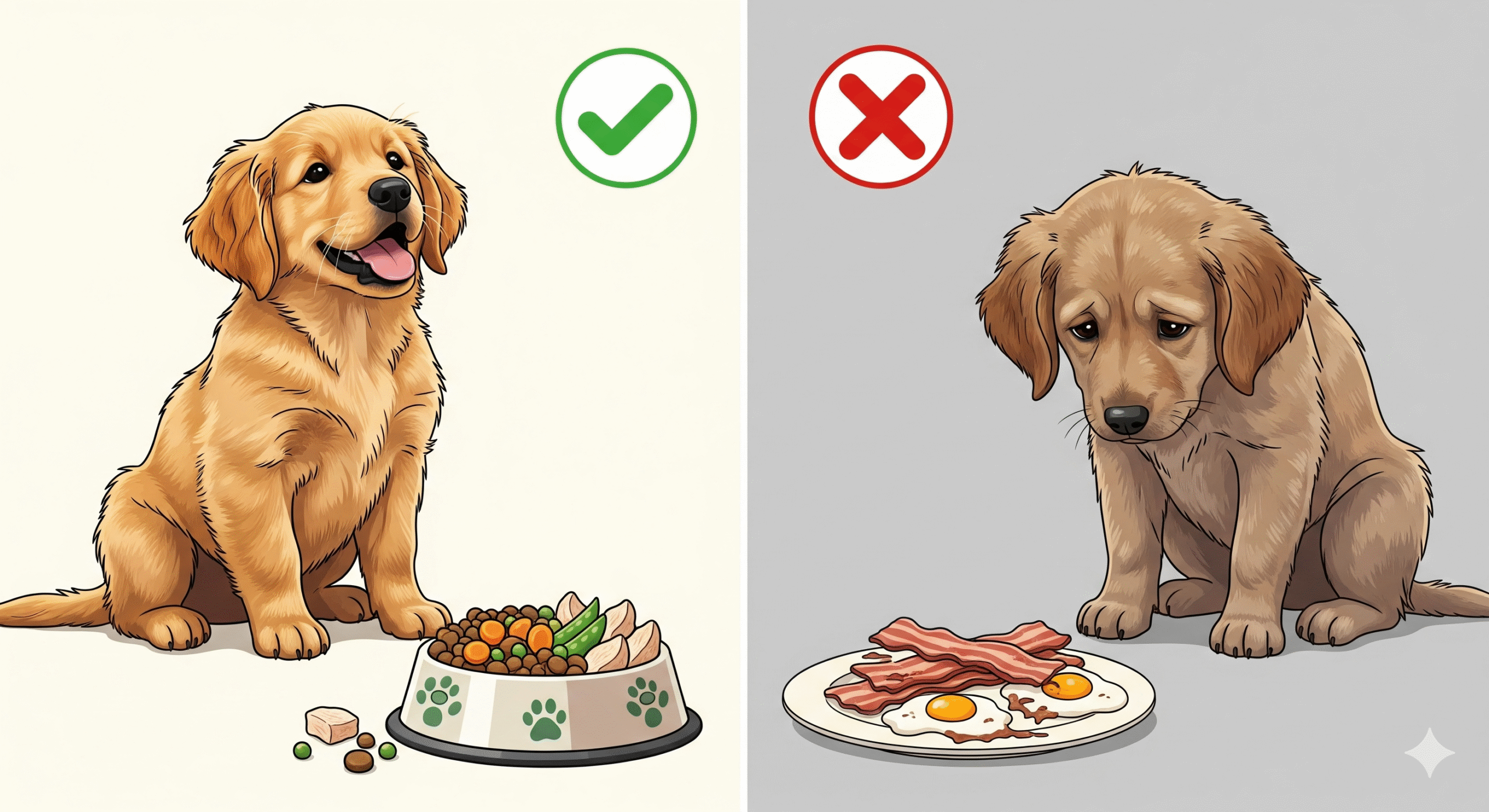Bringing home a new puppy is a joyful adventure, but it also comes with a significant responsibility: protecting their fragile health. A well-executed puppy vaccination schedule is the cornerstone of preventative care, shielding your furry family member from a host of dangerous and potentially fatal diseases. For new pet parents, the list of recommended shots can feel overwhelming. What are DHPP, DA2PP, and Bordetella? When are they due? And why are multiple rounds needed?
This comprehensive guide will demystify the entire process. We’ll walk you through a typical month-by-month puppy vaccination schedule, explain what each vaccine protects against, and discuss the critical importance of timing. Our goal is to empower you with the knowledge you need to have informed conversations with your veterinarian and ensure your puppy gets the best possible protection during their first year of life.
Why Puppies Need a Vaccination Schedule: The Science of Immunity 🧬
Puppies are not born with fully developed immune systems. They receive temporary, passive immunity from their mother’s first milk, called colostrum. This maternal immunity protects them for the first few weeks of life but also interferes with vaccinations.
- The Immunity Gap: As the maternal antibodies naturally wane, there is a period where the puppy is vulnerable. If vaccinated too early, the maternal antibodies will neutralize the vaccine. If vaccinated too late, the puppy is left unprotected.
- Why Multiple Rounds? We administer a series of vaccines (typically every 3-4 weeks) to ensure that as the maternal immunity drops low enough, the vaccine can successfully stimulate the puppy’s own immune system to produce its own long-lasting antibodies. This series continues until we are confident the puppy is fully protected, usually around 16-20 weeks of age.
This delicate balancing act is why adhering to a vet-approved puppy vaccination schedule is non-negotiable.
Core vs. Non-Core Vaccines: What Does Your Puppy Really Need? 🎯
The American Animal Hospital Association (AAHA) categorizes vaccines into two groups:
- Core Vaccines: These are considered essential for all puppies, regardless of lifestyle or location, due to the severe and widespread nature of the diseases they prevent.
- Non-Core Vaccines: These are recommended based on a puppy’s individual risk factors, which include geographic location, local environment, and lifestyle (e.g., will they go to daycare, boarding, or hiking?).
Your veterinarian is your best resource for determining which non-core vaccines your puppy should have.
” While all core vaccinations are crucial, the parvovirus vaccine is often considered one of the most time-sensitive. This highly contagious virus can be devastating for young, unprotected dogs. If you’re bringing home a new puppy, it’s critical to understand the early signs of parvo. For a comprehensive breakdown of what to watch for and what constitutes an emergency, be sure to read our guide on Parvo in Puppies: Early Signs & Emergency Care. Remember, delaying vaccination even by a few days can significantly increase your puppy’s risk.”
The Month-by-Month Puppy Vaccination Schedule 📅
This is a general guideline. Your veterinarian will tailor the exact puppy vaccination schedule based on your puppy’s age at their first visit, local disease prevalence, and overall health.
6-8 Weeks: The First Visit 👶
This is typically a puppy’s first vet visit and the start of their vaccination journey.
- Core Vaccines:
- DHPP (or DA2PP): This is a combination vaccine that protects against four serious diseases:
- Distemper: A often-fatal virus affecting the respiratory, gastrointestinal, and nervous systems.
- Hepatitis (Adenovirus-2): Causes liver disease.
- Parvovirus: A highly contagious and often fatal virus causing severe vomiting and diarrhea. It is especially dangerous for puppies.
- Parainfluenza: A virus contributing to kennel cough.
- DHPP (or DA2PP): This is a combination vaccine that protects against four serious diseases:
- Non-Core Vaccines (may be offered):
- Bordetella: The primary bacteria behind “kennel cough.” Often required for boarding, grooming, or daycare.
- What to Expect: A thorough physical exam, discussion of diet and parasite prevention, and deworming.
10-12 Weeks: Building Protection 🧱
- Core Vaccines:
- DHPP Booster: A second dose to further stimulate the immune system.
- Non-Core Vaccines (based on risk):
- Leptospirosis: A bacterial disease spread through the urine of infected wildlife. It can cause liver and kidney failure and is zoonotic (can be transmitted to humans). Often started at this age.
- Bordetella: If not given at the first visit, it may be given now.
- What to Expect: Another exam to check growth and development.
14-16 Weeks: Closing the Immunity Gap 🔒
This is a critical visit, as maternal antibodies have likely waned enough for the vaccine to be fully effective.
- Core Vaccines:
- DHPP Booster: The final dose in the initial puppy series.
- Rabies: A core vaccine required by law in most places. It is fatal and transmissible to humans. It is usually given at 16 weeks and provides protection for one year.
- Non-Core Vaccines:
- Leptospirosis Booster: If started earlier, this will be the second dose.
- Lyme: For puppies in tick-endemic areas or with high exposure risk.
- What to Expect: Discussion about spay/neuter timing and transitioning to an adult wellness plan.
12-16 Months: The Adult Booster 🐕
- Core Vaccines:
- DHPP Booster: This is the first adult booster for this combo vaccine.
- Rabies Booster: This booster may be good for one year or three years, depending on local laws and the vaccine used.
- Non-Core Boosters: Any non-core vaccines your dog received will also be boosted at this time.
- What to Expect: This visit marks the transition from the puppy vaccination schedule to the adult vaccination schedule, which typically continues every 1-3 years based on vaccine type and veterinarian recommendation.
What to Expect at the Vet & How to Prepare 🏥
Vet visits can be stressful for puppies. Here’s how to make it easier:
- Bring Records: Bring any paperwork from the breeder or shelter.
- Bring a Sample: A fresh stool sample (less than 12 hours old) for a parasite test.
- Stay Calm: Your puppy will pick up on your energy. Use a calm, happy voice.
- Bring Treats: Bring high-value treats to create positive associations with the vet clinic.
- Transport: Use a secure carrier or leash to keep them safe.
Potential Risks: Understanding Vaccine Reactions ⚠️
Vaccines are overwhelmingly safe, but mild reactions can occur.
- Common Mild Reactions: Lethargy, slight fever, soreness at the injection site, and reduced appetite for 24-48 hours.
- Rare Serious Reactions: Facial swelling, hives, vomiting, diarrhea, or collapse. These are medical emergencies and require immediate veterinary attention.
Always discuss the benefits and risks with your vet, especially if your puppy has had a previous reaction.
Conclusion: An Investment in a Long, Healthy Life
Following a structured puppy vaccination schedule is one of the most important investments you can make in your dog’s long-term health and happiness. It protects them from devastating diseases, provides you with peace of mind, and is a fundamental part of responsible pet ownership. While the first year may feel like a constant stream of vet appointments, this short-term effort lays the groundwork for a lifetime of wellness and adventure with your best friend.

❤️ Call to Action (CTA): Is your puppy up to date on their shots? Book an appointment with your veterinarian today to review their records and ensure they are on the right track. For a printable checklist of this schedule, subscribe to our newsletter!






